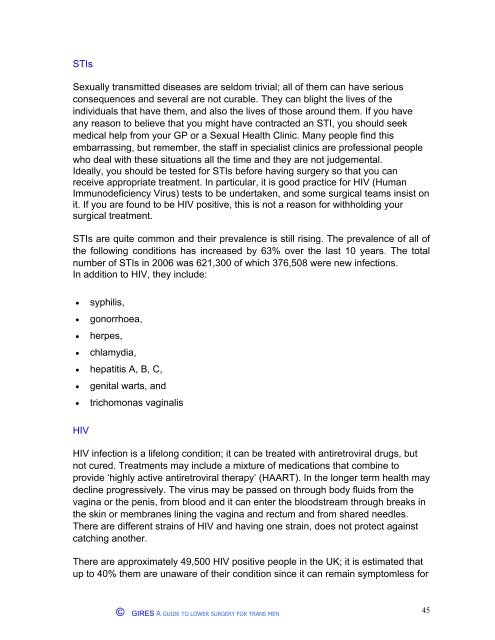A guide to lower surgery for trans men - Gender Identity Research ...
A guide to lower surgery for trans men - Gender Identity Research ...
A guide to lower surgery for trans men - Gender Identity Research ...
You also want an ePaper? Increase the reach of your titles
YUMPU automatically turns print PDFs into web optimized ePapers that Google loves.
STIs<br />
Sexually <strong>trans</strong>mitted diseases are seldom trivial; all of them can have serious<br />
consequences and several are not curable. They can blight the lives of the<br />
individuals that have them, and also the lives of those around them. If you have<br />
any reason <strong>to</strong> believe that you might have contracted an STI, you should seek<br />
medical help from your GP or a Sexual Health Clinic. Many people find this<br />
embarrassing, but remember, the staff in specialist clinics are professional people<br />
who deal with these situations all the time and they are not judge<strong>men</strong>tal.<br />
Ideally, you should be tested <strong>for</strong> STIs be<strong>for</strong>e having <strong>surgery</strong> so that you can<br />
receive appropriate treat<strong>men</strong>t. In particular, it is good practice <strong>for</strong> HIV (Human<br />
Immunodeficiency Virus) tests <strong>to</strong> be undertaken, and some surgical teams insist on<br />
it. If you are found <strong>to</strong> be HIV positive, this is not a reason <strong>for</strong> withholding your<br />
surgical treat<strong>men</strong>t.<br />
STIs are quite common and their prevalence is still rising. The prevalence of all of<br />
the following conditions has increased by 63% over the last 10 years. The <strong>to</strong>tal<br />
number of STIs in 2006 was 621,300 of which 376,508 were new infections.<br />
In addition <strong>to</strong> HIV, they include:<br />
syphilis,<br />
gonorrhoea,<br />
herpes,<br />
chlamydia,<br />
hepatitis A, B, C,<br />
genital warts, and<br />
trichomonas vaginalis<br />
HIV<br />
HIV infection is a lifelong condition; it can be treated with antiretroviral drugs, but<br />
not cured. Treat<strong>men</strong>ts may include a mixture of medications that combine <strong>to</strong><br />
provide ‘highly active antiretroviral therapy’ (HAART). In the longer term health may<br />
decline progressively. The virus may be passed on through body fluids from the<br />
vagina or the penis, from blood and it can enter the bloodstream through breaks in<br />
the skin or membranes lining the vagina and rectum and from shared needles.<br />
There are different strains of HIV and having one strain, does not protect against<br />
catching another.<br />
There are approximately 49,500 HIV positive people in the UK; it is estimated that<br />
up <strong>to</strong> 40% them are unaware of their condition since it can remain symp<strong>to</strong>mless <strong>for</strong><br />
© GIRES A GUIDE TO LOWER SURGERY FOR TRANS MEN<br />
45
















